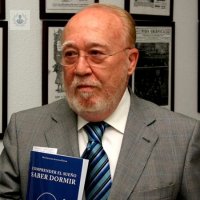Los niños también sufren depresión postvacacional
Written in association with:Currently, there is scientific evidence that a high percentage of adults suffer from "post-holiday depression" on their return to work. Although to a lesser extent, this syndrome can also be suffered by children, although it should not be frequent.

Children associate school with friends and fun. The negative qualification of the post-holiday situation as depression or syndrome is recent and breaks the philosophy of effort. Work and rest are as complementary as day and night, and can not be classified as antagonistic, that cause suffering, neither for adults, nor for children.
Differences between post-holiday depression in children and adults
The return to school is, each course for the child, the beginning of a cycle that links with the previous one and is regulated, with the stimulus of curiosity, by the individual needs of progress and development.
The adult is reintegrated into the known, routine activity, which is accepted as a pressure of obligation, in too many cases, when it is not sufficiently rewarding.
Unfortunately, there are not many adults who enjoy their professional activity. And for children we must try to be an illusion to enhance skills and abilities.
What to do when the post-holiday depression lasts longer than usual
The restlessness about going back to school in children does not usually last more than two days. The ideal is to excite them with positive comments that provoke the stimulus of overcoming, so that the matter is treated as normally as possible. If these measures prove unsuccessful, some motivational game can be done to go to school.
How the educational system influences the return to school

The current educational system is, in itself, inconsequential in general in relation to the return to school activity, but according to the educational development with the program of the center, it will be looked at with illusion or with suspicion.
Regarding the tasks of the school, the load must be progressive, starting the course with an affordable level until reaching a high rhythm. Progressive training is always necessary.
Is it recommended that the child attend extracurricular activities?
Classes must be focused on the center without having to attend extracurricular classes, with some complementary duties that allow the continuity of the training concept between the home and the center.
As extracurricular activities, formative cultural activities of sensitivity with reading in the foreground are recommended, and those related to artistic manifestations, both to learn and to admire such as music, painting, visits to museums, etc.
How to increase children's school performance
The sedentary lifestyle harms school performance, so it is advisable to incorporate playful activities into the routine of children so that they feel more motivated when carrying out their obligations.
Team sports activities facilitate physical evolution with a positive impact on body development and training learning competition and generosity behaviors.
As for the use of technological devices, very present in everyday life today, it could be useful in the child's leisure time. However, the abuse of them is harmful with the risks of addiction and isolation in infrasocialization.
School performance and nutrition

It is very important to administer a balanced diet, with the carbohydrates that provide the necessary energy for any activity, in a predominant amount; with the proteins that facilitate growth and development in sufficient quantity, and the amount of fats controlled, with sufficient supply of natural vitamins in fruits and vegetables. Controlled nutrition provides the basis of an organism prepared for the fulfillment of its needs and activities.


